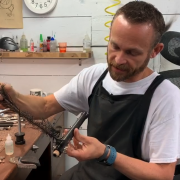Post 56: Why we recommend oiling…
The oboe oiling debate will never cease. I’ve been a member of the double reed community for nearly 30 years at this point, and I have always seen the conversation around whether you should oil or not. I’m sure there’s some scientific data out there to support or not support oiling, however, the variables involved are so inconsistent that it’s hard to say with certainty one way or the other. Therefore, most people talk about oiling or not oiling from a personal experience perspective. This post will be no different, it’s just a conversation with my thoughts on why I do believe in oiling oboes, and clarinets for that matter.
Let’s face facts! Most of us do certain things and believe in certain methods because our primary teachers believe in them. We love our teachers! So, just like I believe in swabbing, I believe in oiling. My primary teacher, Dr. Dan Ross, believes in oiling and I watched him oil his oboe many times through the years. I, in turn, oiled my oboe many times through the years while I was a student and then afterward as I moved into being a professional.
The basic reasons I believe in oiling are very simple. Oiling conditions the wood to help keep it hydrated which, in turn, helps prevent cracking under some circumstances and retains the amazing qualities of the wood for a longer period of time.
I personally played a K series Loree oboe for just over 20 years. I believe, due to the oiling, I never had a crack and the amazing dark timbre of the oboe was retained through the years. (NOTE: I oiled the oboe when it was new almost every day for a month. Every morning I would check it and the oil was gone, “soaked up.” I continued oiling frequently until the oboe stopped soaking up the oil as much, then I slowed down the frequency even more, etc. Eventually, I only oiled that oboe a couple of times a year. I believe the wood will tell you when it needs to be oiled.)
I once heard a story which I believe to be true. A repairer wanted to dispel the “need to oil” myth. He took a piece of Grenadilla wood and completely submerged it for two years. At the end of the two years, he removed the wood and cut it in half. What did he find? Those of us that believe in oiling would like for the wood to be soaked, but that was not the case. He cut the piece of Grenadilla in half and found no oil penetration. This repairer concluded that oiling is not necessary because the oil does not penetrate deep into the wood.
In my mind, this previous story does not conclude anything, except that Grenadilla will not soak through. If anything this study helps show that we do need to oil or moisturize our wooden wind instruments. Imagine if oil cannot penetrate deep into the wood, how fast the wood will dry out without protection. This is one reason I think we should oil because we need to keep the wood conditioned. Look at any piece of wood that has been cut down from originally being a living tree. Over time it drys out and breaks down, especially when it is introduced to different temperatures and moisture. When wood drys out it becomes less dense, therefore losing all its beautiful original “wood” characteristics that you purchased it for in the first place. Manufacturers know this all too well as they are making instruments with more wood, which makes them heavier, to appeal to players who want a deep dark sound! More weight or more denseness makes deeper darker sounds. So to conclude this paragraph, I have found that oiling a wooden wind instrument consistently over time will extend its life regarding tone and potential damage to cracking.
(Side note to oiling and saturation. If you oiled your oboe and the wood became saturated, the oboe would be unplayable at that point. Why? Because we cannot be playing our instruments with oil oozing out all over us, it would also ruin all pads and corks over time. The only thing we need oozing out of our oboes is beautiful music! Lol.)
There are a few other ideas I have that I feel are more common sense taken from my observations over the years. Have you ever “oiled” furniture? I grew up seeing my mother and grandmothers oiling their furniture, especially antique furniture. Why? Did the oil penetrate deep into the wood fibers? I can’t say for sure, but I would guess that it did not. What it did do was add a protective layer of moisture to help prevent the wood from completely drying out. By not drying out, the wood joints would remain tight over the years, the wood would have minimal shrinkage and/or warpage, and the wood surface would not crack. This process is done in various ways on all types of woods, really hard dense woods and softer less dense woods, all to achieve the same results of having a beautiful piece of furniture for generations to come.
This next thought has nothing to do with wood, so is probably irrelevant, but I’m gonna mention it anyway. When our hands become dry, we most likely apply lotion to our hands. We don’t do this for the lotion to penetrate deep into our tissue then into our bloodstream, but only to condition and moisturize the exterior layer of our skin. We are conditioning our skin so that it doesn’t dry out, crack or peel. I find this example to be similar to oiling wood in many ways. Again it’s not exactly the same as wood, but carries with it the same thought process, application, and results.
Read our Oboe Oiling Procedure here: https://www.onksws.com/2018/10/15/oboe-oiling-procedure/
Click here https://youtu.be/mz4zFshuaB8 to view a video of Jason demonstrating the oiling procedure.



